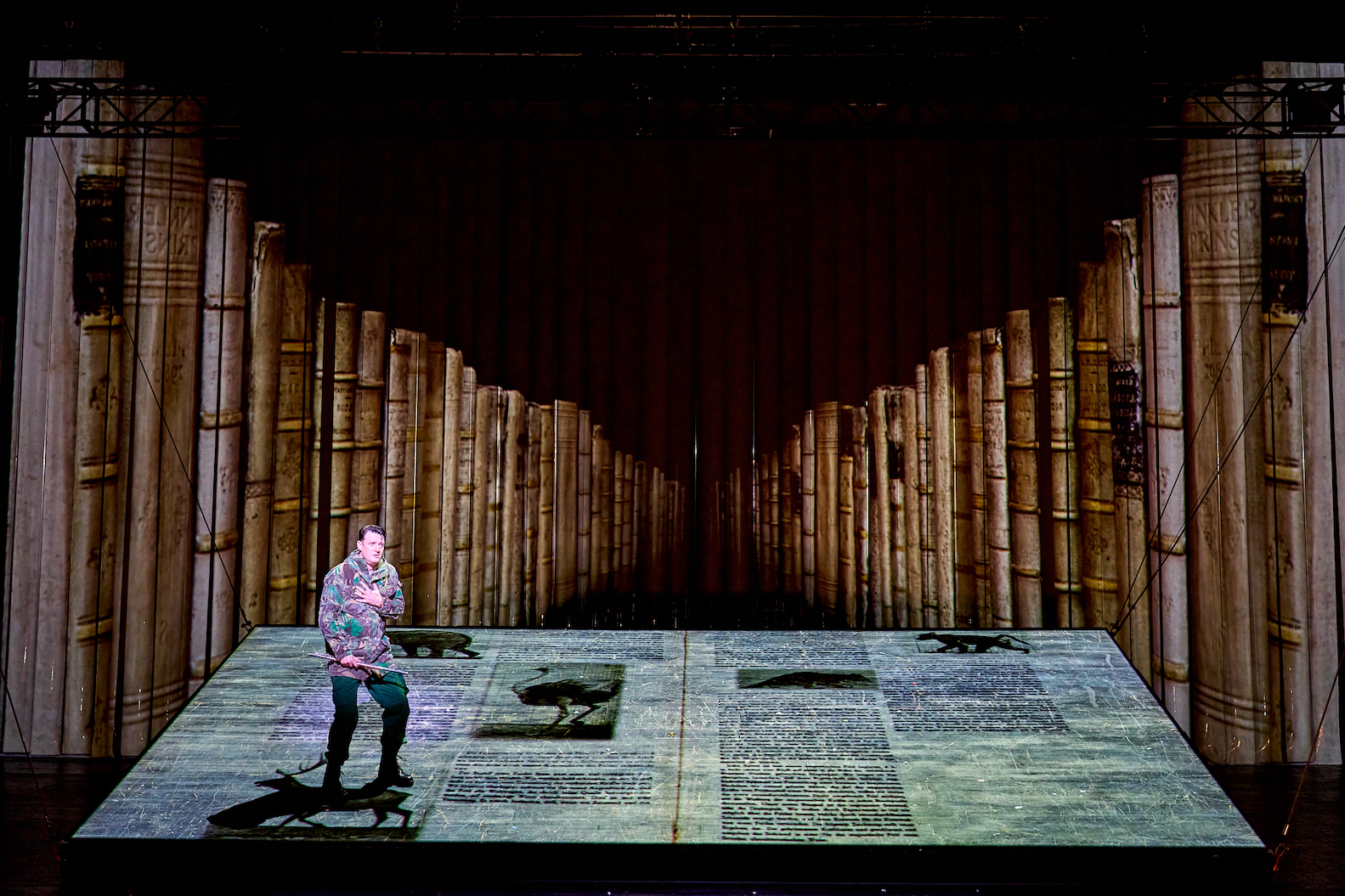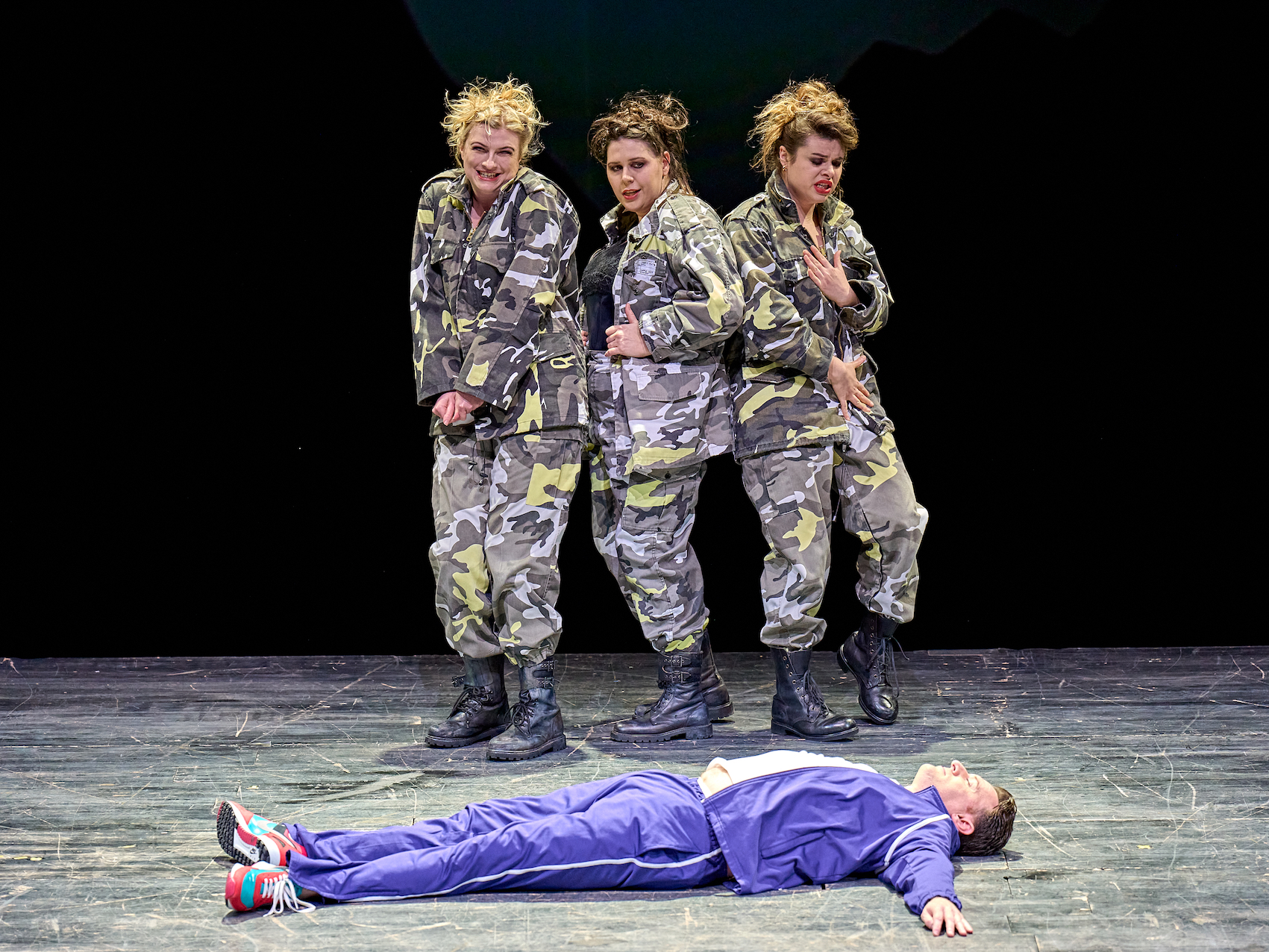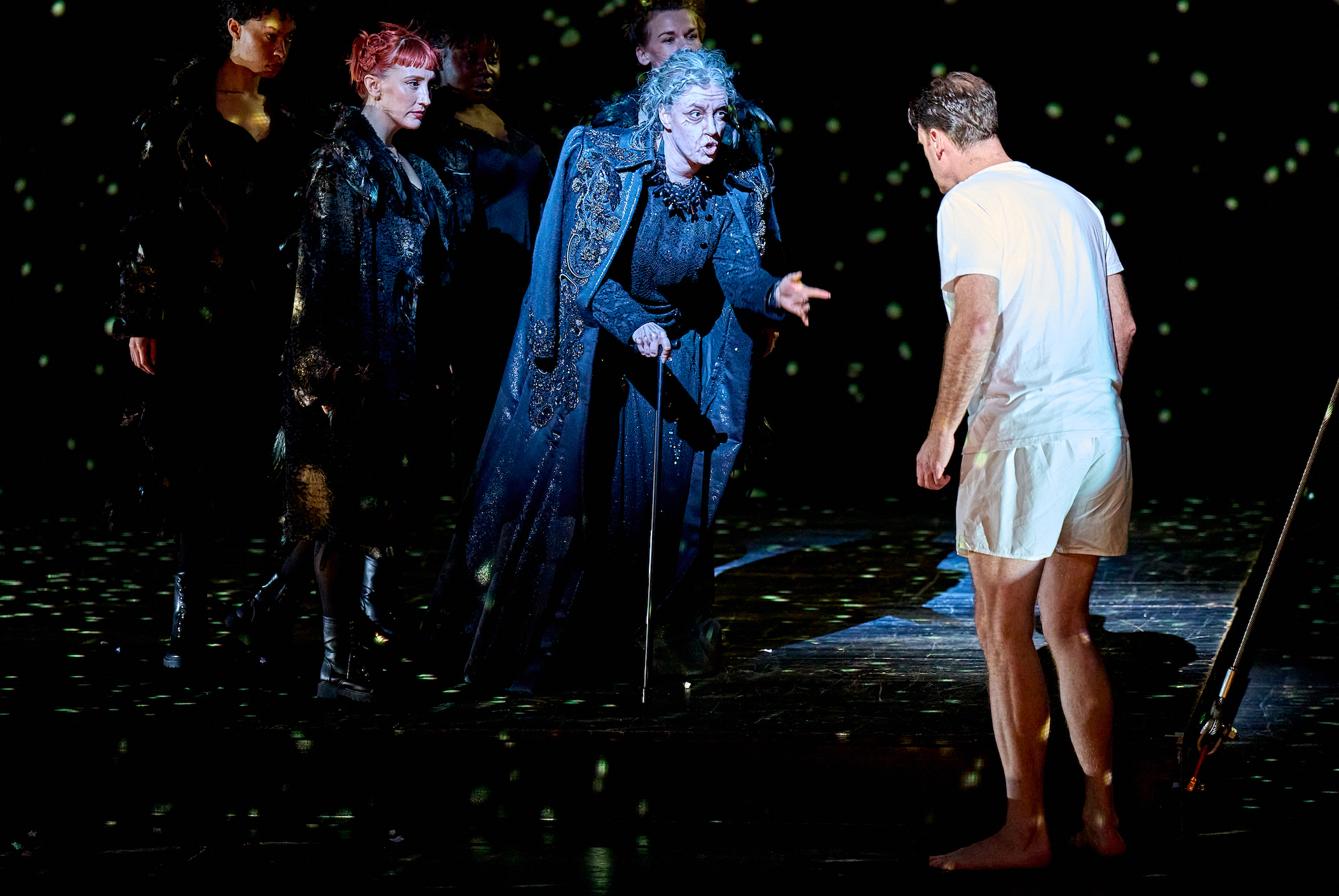The Magic Flute, English National Opera review - return of an enchanted evening | reviews, news & interviews
The Magic Flute, English National Opera review - return of an enchanted evening
The Magic Flute, English National Opera review - return of an enchanted evening
Simon McBurney's dark pantomime casts its spell again

Trials by fire and water pale in comparison with trials by Arts Council England. English National Opera’s long torment has lately involved redundancy notices issued mid-performance and the enforcement of a sub-standard contract for chorus and musicians.
I know that McBurney’s busy, tricksy take on the mystical pantomime of Mozart’s sublime farewell to the stage did not win blanket approval first time round (not least from my colleague David Nice). Maybe Hewer has softened and lightened the ever-artful Complicité style of “total theatre”, and the vocal resources at her disposal have moved up a notch or two. Whatever the reason, the show, for all its self-conscious ingenuity, now mostly glows with charm, warmth and (when needed) depth. Any fair-minded extraterrestrial visitor from Mozart’s “sevenfold circle of the sun” would surely treat a political and managerial regime intent – as the current lot are – on wrecking this company as utterly deranged.
 Yes, the floating, tilting platform whose gyrations dictate much of the cast’s movement does a bit too much conspicuous work for its own good. Yes, McBurney’s gloomy, almost monochrome, palette relentlessly rubs in the dystopian “darkness” of this world that imposes terrible afflictions on seekers after truth and love – although I found that the refusal of picturesque exoticism in Michael Levine’s sets and Jean Kalman’s lighting sometimes made the music’s ever-changing colours stand out even more boldly. Yes, those fluttering scores as the music literally takes wing become an overworked tic. Yes, the visible on-stage video and sound artists (Ben Thompson, Ruth Sullivan) make the old formalist point about “laying bare the device” a little too insistently. We soon get the idea about giant projected hands writing titles and stage directions, or drawing arrows to indicate characters: this is artistic and indeed human truth that comes from fiction, from invention.
Yes, the floating, tilting platform whose gyrations dictate much of the cast’s movement does a bit too much conspicuous work for its own good. Yes, McBurney’s gloomy, almost monochrome, palette relentlessly rubs in the dystopian “darkness” of this world that imposes terrible afflictions on seekers after truth and love – although I found that the refusal of picturesque exoticism in Michael Levine’s sets and Jean Kalman’s lighting sometimes made the music’s ever-changing colours stand out even more boldly. Yes, those fluttering scores as the music literally takes wing become an overworked tic. Yes, the visible on-stage video and sound artists (Ben Thompson, Ruth Sullivan) make the old formalist point about “laying bare the device” a little too insistently. We soon get the idea about giant projected hands writing titles and stage directions, or drawing arrows to indicate characters: this is artistic and indeed human truth that comes from fiction, from invention.
Yet at moments such as the emergence of an animated elephant from a drawn sketch, the realisation that mere marks on paper have generated this enchantment can still be intensely moving (above, Norman Reinhardt pictured by Manuel Harlan). And the prominence of the orchestra, led by Rebecca Chan, in their raised pit works consistently well: Erina Yashima conducted with panache, drawing savoury flavours from brass and woods at key junctures. This heightened visibility also makes it natural for flautist Claire Wickes to step on stage for her (deftly executed) solos. These aren’t “alienation” effects in the student agitprop sense so much as an invitation to the audience to join in the casting of a collective spell. And, from the ribald byplay of the combat-clad Three Ladies (Carrie-Ann Williams, Amy Holyland, Stephanie Wake-Edwards, pictured below) as they debag the lost Tamino to Papageno’s later romps into the audience, the comedy is delivered with full-on unapologetic relish. In Mozart’s universe we can’t have spiritual visions without all-too-human slapstick.
 None of which would matter much if the singing let the stagecraft down. A few slight wobbles aside, it never does. If Norman Reinhardt’s Tamino underlined feeling and gesture too heavily in “Dies Bildnis ist bezaubernd Schön” (or rather, the equivalent in Stephen Jeffreys’s nimble translation), he later found a tender nobility during his quest for Pamina and successive ordeals. Sarah Tynan’s Pamina has middleweight grace and elegance until, with her stricken “Ach! Ich fühls”, she released an expressive power that shifted her performance into a higher gear. You may quibble with McBurney’s conception of an infirm, sometimes wheelchair-bound Queen of the Night – humanity’s ancient matriarchy about to be ousted by Sarastro’s modern patriarchal order? – but Rainelle Krause (pictured below) absolutely aced the arias, formidably firm and sure at the top, burning with the dark radiance of a dying sun.
None of which would matter much if the singing let the stagecraft down. A few slight wobbles aside, it never does. If Norman Reinhardt’s Tamino underlined feeling and gesture too heavily in “Dies Bildnis ist bezaubernd Schön” (or rather, the equivalent in Stephen Jeffreys’s nimble translation), he later found a tender nobility during his quest for Pamina and successive ordeals. Sarah Tynan’s Pamina has middleweight grace and elegance until, with her stricken “Ach! Ich fühls”, she released an expressive power that shifted her performance into a higher gear. You may quibble with McBurney’s conception of an infirm, sometimes wheelchair-bound Queen of the Night – humanity’s ancient matriarchy about to be ousted by Sarastro’s modern patriarchal order? – but Rainelle Krause (pictured below) absolutely aced the arias, formidably firm and sure at the top, burning with the dark radiance of a dying sun.
Peter Hoare’s creepy, gangster-ish Monostatos is vocally robust, and when the magic music bewitches his pink-clad henchmen into a little ring-dance, we almost enter Paddington 2 territory (not such a bad thing perhaps...). It’s hard for a bass-baritone on full power to stumble with Sarastro, but John Relyea’s charismatic voice – teak, smoke and bronze in one – made the halls of Isis and Osiris a truly compelling venue. McBurney/Hewer present him as a Xi Jinping figure directing his Central Committee (around a vast table) in a programme of top-down enlightenment: a new, all-male magic of reason and reading against the star-spangled enchantments guarded by the Queen and her female forces.
 However, it’s David Stout’s Papageno who regularly threatens to run away with the evening. Although his spoken style has a few “Carry On...” touches, his rich, nuanced baritone periodically turns the cheeky chappie into a credible lovelorn pilgrim. His tender chemistry with Pamina makes “Bein Männern, Welche Liebe fühlen”, a piquant joy while his second-act comedy routines – on stage and in the audience – temper farcical silliness with proper pathos. They do, however, take up a shade too much time.
However, it’s David Stout’s Papageno who regularly threatens to run away with the evening. Although his spoken style has a few “Carry On...” touches, his rich, nuanced baritone periodically turns the cheeky chappie into a credible lovelorn pilgrim. His tender chemistry with Pamina makes “Bein Männern, Welche Liebe fühlen”, a piquant joy while his second-act comedy routines – on stage and in the audience – temper farcical silliness with proper pathos. They do, however, take up a shade too much time.
United at last with his Papagena (Alexandra Oomens), Stout has enough of the trickster-joker’s mischief-making prowess to mean that Sarastro’s solemnity never has the last word as the Great Leader promulgates his own authoritarian version of “wisdom and love”. Yet the fire-and-water ordeals imposed on Pamina and Tamino have a spectacular impact, and the crowded stage of the finale – with extra actors and a super-sized chorus – closes the show in well-marshalled majesty. On this uplifting evidence the ENO has the resilience to surmount its time of endless trials and look forward (let’s hope) to a new Age of Enlightenment.
Add comment
The future of Arts Journalism
You can stop theartsdesk.com closing!
We urgently need financing to survive. Our fundraising drive has thus far raised £49,000 but we need to reach £100,000 or we will be forced to close. Please contribute here: https://gofund.me/c3f6033d
And if you can forward this information to anyone who might assist, we’d be grateful.

Subscribe to theartsdesk.com
Thank you for continuing to read our work on theartsdesk.com. For unlimited access to every article in its entirety, including our archive of more than 15,000 pieces, we're asking for £5 per month or £40 per year. We feel it's a very good deal, and hope you do too.
To take a subscription now simply click here.
And if you're looking for that extra gift for a friend or family member, why not treat them to a theartsdesk.com gift subscription?
more Opera
 Carmen, English National Opera review - not quite dangerous
Hopes for Niamh O’Sullivan only partly fulfilled, though much good singing throughout
Carmen, English National Opera review - not quite dangerous
Hopes for Niamh O’Sullivan only partly fulfilled, though much good singing throughout
 Giustino, Linbury Theatre review - a stylish account of a slight opera
Gods, mortals and monsters do battle in Handel's charming drama
Giustino, Linbury Theatre review - a stylish account of a slight opera
Gods, mortals and monsters do battle in Handel's charming drama
 Susanna, Opera North review - hybrid staging of a Handel oratorio
Dance and signing complement outstanding singing in a story of virtue rewarded
Susanna, Opera North review - hybrid staging of a Handel oratorio
Dance and signing complement outstanding singing in a story of virtue rewarded
 Ariodante, Opéra Garnier, Paris review - a blast of Baroque beauty
A near-perfect night at the opera
Ariodante, Opéra Garnier, Paris review - a blast of Baroque beauty
A near-perfect night at the opera
 Cinderella/La Cenerentola, English National Opera review - the truth behind the tinsel
Appealing performances cut through hyperactive stagecraft
Cinderella/La Cenerentola, English National Opera review - the truth behind the tinsel
Appealing performances cut through hyperactive stagecraft
 Tosca, Royal Opera review - Ailyn Pérez steps in as the most vivid of divas
Jakub Hrůša’s multicoloured Puccini last night found a soprano to match
Tosca, Royal Opera review - Ailyn Pérez steps in as the most vivid of divas
Jakub Hrůša’s multicoloured Puccini last night found a soprano to match
 Tosca, Welsh National Opera review - a great company reduced to brilliance
The old warhorse made special by the basics
Tosca, Welsh National Opera review - a great company reduced to brilliance
The old warhorse made special by the basics
 BBC Proms: The Marriage of Figaro, Glyndebourne Festival review - merriment and menace
Strong Proms transfer for a robust and affecting show
BBC Proms: The Marriage of Figaro, Glyndebourne Festival review - merriment and menace
Strong Proms transfer for a robust and affecting show
 BBC Proms: Suor Angelica, LSO, Pappano review - earthly passion, heavenly grief
A Sister to remember blesses Puccini's convent tragedy
BBC Proms: Suor Angelica, LSO, Pappano review - earthly passion, heavenly grief
A Sister to remember blesses Puccini's convent tragedy
 Orpheus and Eurydice, Opera Queensland/SCO, Edinburgh International Festival 2025 review - dazzling, but distracting
Eye-popping acrobatics don’t always assist in Gluck’s quest for operatic truth
Orpheus and Eurydice, Opera Queensland/SCO, Edinburgh International Festival 2025 review - dazzling, but distracting
Eye-popping acrobatics don’t always assist in Gluck’s quest for operatic truth
 MARS, Irish National Opera review - silly space oddity with fun stretches
Cast, orchestra and production give Jennifer Walshe’s bold collage their all
MARS, Irish National Opera review - silly space oddity with fun stretches
Cast, orchestra and production give Jennifer Walshe’s bold collage their all
 Káťa Kabanová, Glyndebourne review - emotional concentration in a salle modulable
Janáček superbly done through or in spite of the symbolism
Káťa Kabanová, Glyndebourne review - emotional concentration in a salle modulable
Janáček superbly done through or in spite of the symbolism

Comments
Let me note, in the light of
Let me note, in the light of Boyd's comment about first time round, that though Alexandra Coghlan reviewed the revival conducted by Mark Wigglesworth, I went with her, and loved it: as day to night.